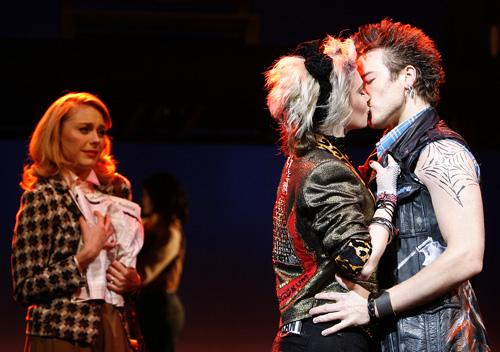U.S. now playing stage version of ‘Desperately Seeking Susan’

Mark McGee, Emma Williams and Kelly Price pose at Novello Theatre in London in this Nov. 12 file photo. Akira Suemori, The Associated Press
November 14, 2007
LONDON – “Desperately Seeking Susan” without Madonna? It’s either sacrilege, or a stroke of genius.
Thursday sees the West End opening of a stage musical based on the spiky-but-sweet 1985 movie that brought Madonna’s bangles, bows and bad-girl attitude to a huge audience.
The story of a bored New Jersey housewife, played by Rosanna Arquette, and a downtown hipster – Madonna’s breakout role – whose lives intersect through a series of wacky coincidences, it has become a cult classic, with a lively rock, rap and soul soundtrack that includes Madonna’s “Into the Groove.”
In the stage version, Susan is more punk than Material Girl, and the songs are supplied by new wave icons Blondie, whose distinctive blend of punk, pop, reggae and rap was one of the most distinctive sounds of the late 1970s.
The show features Blondie songs including “Heart of Glass,” “Atomic,” “One Way or Another,” “Dreaming” and “The Tide Is High,” as well as a new composition by frontwoman Debbie Harry.
Get The Daily Illini in your inbox!
“It’s surprising the number of people who have said, ‘Of course, it was Blondie music in the film, wasn’t it? They were the soundtrack,'” said Emma Williams, the 24-year-old British performer who plays the title role. “It just fits so well.”
“Susan” is the latest addition to a slew of “jukebox musicals” that mine the hits of an enduring musical act. London has been particularly welcoming to the genre, with ABBA musical “Mama Mia!” and Queen tribute “We Will Rock You” enjoying long runs. The West End has even found room for a Rod Stewart musical, “Tonight’s the Night,” and a show based on the catalog of 1990s boy band Take That.
The new show’s New York-based writer Peter Michael Marino says the film and Blondie are a natural fit. He discovered this when, as an experiment, he watched the movie to the accompaniment of Blondie’s greatest hits.
“The first song was ‘Dreaming,’ and the opening scene is a woman who’s dreaming about meeting this girl whose fantasy life she’s been following in the personal ads,” said Marino, whose writing credits include 1950s pulp homage, “Hollywood Nurses.”
“The next scene was Susan in the hotel room finishing up with her liaison for the night, and the next track on the CD was ‘Call Me.’ It sort of all fell into place.”
Others were equally enthusiastic, including producer Susan Gallin and Harry, who agreed to the use of Blondie’s songs after reading Marino’s outline for the show.
“For me, what the movie is about is a woman who fantasizes a different life, and then she gets it. Because of a number of quirky twists of fate she ends up with this life she has been fantasizing about,” Gallin said. “What Peter brought was a way of making it into a musical that made perfect sense. It just seemed as though the spirit and the edge of the Blondie music worked with the emotion of the movie.”
The show has had a bumpy ride to its West End premiere. It has been substantially reworked during a month of previews after a lackluster response from early audiences. Marino concedes the process has been “terrifying,” but says it has resulted in a show that is bigger, bolder and grittier than its cinematic inspiration.
“I always say the film is sort of like a Sunday-afternoon film: very soothing, very enjoyable, it sort of makes you smirk and gives you a little tickle in your heart,” Marino said a few days before the show’s opening night at London’s Novello Theatre. “But a musical should be a Saturday-night story.”
Fans of the movie will be happy that many of their favorite moments are intact – notably the scene in which Susan blow-dries her armpits in a bus-station bathroom.
But there are significant changes. Marino has set the show in 1979, rather than the mid-80s, to capture an edgier New York, before yuppies and gentrification. Musically, it was the era of the Ramones, clubs like CBGBs – and Blondie, who wrote most of their hits between 1977 and 1980.
“In 1985, kids who went to New York City came from the suburbs and dressed like punks. In 1979, the kids lived in the city, because they could afford it, and they were punks,” he said. “The film is glossy. The show is much dirtier and grittier.”
Williams, a rising star whose West End credits include “Bat Boy” and “Chitty Chitty Bang Bang,” says her character pays homage to Madonna but is very much her own woman.
“To me, she’s a combination of Debbie Harry, Madonna, Courtney Love, Shirley Manson, Gwen Stefani – the people who are individual,” she said.
The show’s creators say they are confident British audiences will embrace it.
The movie may not be as well known here as in the United States, but British music fans made stars of Blondie before the band hit the United States big time.
“My only concern,” Gallin said, “is that the British audience doesn’t quite get what New Jersey means.”
A problem that extends, said Marino, to some British actors.
“Actors used to come into the auditions and talk like the Sopranos,” he said.






